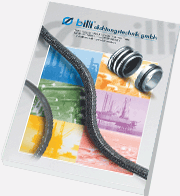PTFE Envelope gaskets from billi seals
An envelope gasket is a special form of flat gasket. Enveloped means that the gasket core is encased in an envelope. An envelope gasket therefore combines the advantages of two sealing materials, such as PTFE and graphite, in one gasket. The areas of application for encapsulated gaskets are correspondingly diverse. They are used in mild to highly corrosive environments. The range of standard sizes and configurations is broad. However, billi seals also offers custom-made products that we manufacture according to your requirements.
PTFE Envelope gaskets from billi seals - your advantages at a glance
- We produce wrapped gaskets from one piece.
- We manufacture individual pieces.
- We manufacture customised wrapped gaskets according to your requirements.
- Our seals are of high quality.
- Personalised expert advice is a matter of course for us.
- We process your order quickly.
- Production takes place in our in-house workshop.
- We have a large stock.
- Our delivery times are short.

Order cheap stuffing box packings from billi
All in all, billi stuffing box packings represent the perfect combination of high-quality workmanship and practical handling. The production from innovative materials results in maximum sealing efficiency. The packings are therefore an excellent alternative to classic mechanical seals and enable reliable sealing of valve spindles or pump shafts. The result is time-saving installations with little technical effort and reduced costs. If you have any questions about individual packings or the ordering process, we will be happy to provide you with personalised advice.
PTFE Envelope gaskets from billi seals for your requirements
In a PTFE envelope gasket, the high chemical resistance of PTFE is combined with the mechanical behaviour of the respective insert material. The core material determines the elasticity of the seal. Viewed as a sealing system, the encapsulated gaskets are used at temperatures between -195 and +260 degrees Celsius. They can also be used at varying pressures. We will be happy to clarify which material combination best suits your application in a personal consultation.
PTFE is usually used as the material for the envelope, which is why the gasket is often referred to as a PTFE envelope gasket. The typical insert is made of rubber, graphite, ePFTE, PFTE or glass fibre. A steel insert is used for large flange radii or for connecting flanges with high contact pressure. An envelope gasket with a corrugated ring insert is recommended for medium contact pressure, unevenness or large flange radii.
With envelope gaskets, the casing protects the core from chemical attacks caused by the medium to be sealed. As the gasket core yields to the contact pressure, it has a supporting function. For this reason, the contact pressure must be higher with an envelope gasket than with a flat gasket without an envelope. This presupposes that the flanges are stable when using enveloped gaskets.
Envelope gaskets can be used in a wide range of applications. Due to their chemical compatibility, they can withstand contact with chemicals that are extremely aggressive. As the seals are FDA-compliant, they can also be used in the food industry. Other areas of application include the pharmaceutical and chemical industries or plant, pipeline and container construction. Coated gaskets are also used for steel flanges, steel containers and stress-sensitive plastic and glass-lined flanges.



![[Translate to Englisch:] Stopfbuchspackungen](/header/Packungen_billi_seals.jpg)

